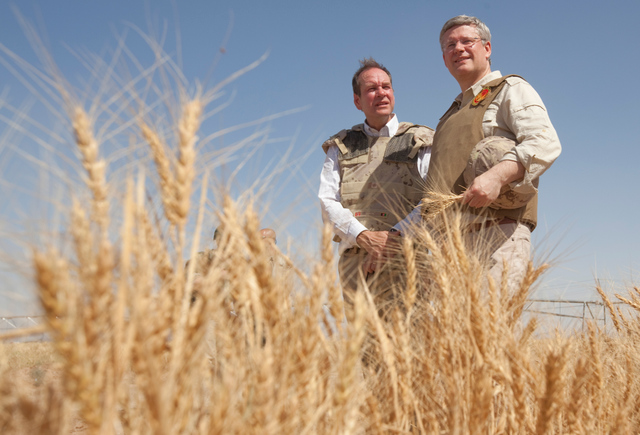Foreign Affairs Minister Rob Nicholson has been reciting his talking points to justify extending and expanding the token Canadian military mission to the middle east: the Islamic State is “committing acts of genocide.” Canada’s expanded mission to Iraq and Syria will “strip ISIL [Islamic State of Iraq and the Levant] of its power to …launch terrorists operations in Canada”. Extending our mission is a matter of “moral clarity.” We need to learn the lessons of Canada’s mission in Afghanistan.
All need cross-examination.
Learning from the past is an uncommonly sensible idea from this government. What are the lessons of past Western interventions?
Afghanistan. Today’s mess began several decades ago when the U.S. — understanding almost nothing about the country — began arming local militias against the Soviet Union. Among those armed was Osama Bin Laden along with various competing warlords guilty of unspeakable atrocities, who soon turned on the U.S. and each other. Out of this recklessness sprung al-Qaeda, the Taliban, 9/11 and the appalling protracted international conflict that followed. Canada was there for a dozen years. Today the country remains mired in misogyny, corruption, instability, heroin and violence.
Iran. Decades earlier, understanding little about the country beyond its oil riches, the U.S. and U.K. overthrew an elected government and substituted the harsh authoritarianism of the Shah. The eventual consequence was the Khomeini revolution and rule by the mullahs. We may complacently remember Argo; Iranians remember the coup and may never again trust the West.
Iraq. In 2003, George W. Bush and Tony Blair invaded Iraq on the basis of several different lies and no serious understanding. Saddam Hussein was overthrown; the country fell apart. Regional, ethnic and religious conflicts became the order of the day. Hundreds of thousands of Iraqis died. The winners have been the Islamic State and Iran. Today the country remains ungovernable, chaotic, on the verge of dissolution.
Libya. As a kind of Arab Spring broke out, the West intervened against Moammar Gadhafi, an erstwhile ally. Understanding little about the complexities of the country, Western countries enabled his capture and murder. Who took over? A cacophony of competing gangs and militias. What happened to Gadhafi’s vast arsenal? It’s been redistributed across upper Africa and the Middle East, probably some to the Islamic State itself. The country is in turmoil, anarchy, wracked by violence.
Now add Syria, at least as complex, thorny and impenetrable as any of the others.
Lesson learned? We’re living them. They’re in the headlines every day. The consequences expected of military intrusions are rarely achieved. On the contrary: overwhelmingly, when the west has intervened in foreign lands with little understanding of local conditions and no strategy or plan beyond military force — we should add here Vietnam and Cambodia, though they aren’t Muslim like all the others — the result has been increased violence and chaos there and increased danger to ourselves as shown by al-Qaeda, 9/11 and the Islamic State.
Mr. Nicholson speaks of moral clarity. He’s right. Canada’s mission involves collaboration with war criminals, mass murderers, ethnic cleansers and deadly fanatics of various kinds. How else to describe the rulers of Syria and Iran, our tacit allies against IS? Or the Iraqi militias — also allies — described by the United Nations as guilty of war crimes and perhaps crimes against humanity? Or Kurd fighters from an organization listed as terrorist by NATO? We’re already tight with Saudi Arabia, which can teach IS lessons about serious beheadings.
The truth is many of our allies are hardly better than IS itself. That’s what’s morally clear. We throw around accusations of genocide against ISIS when we ourselves collaborate with war criminals and terrorists. Is it moral to send our troops into Syria when we haven’t been invited by its government, a clear violation of international law despite the government’s flimsy rationalizations? (Ask Putin about the Ukraine.)
Is it moral to pretend the expanded mission is risk-free, as Jason Kenney shockingly does? Ask the family of the late Sgt. Andrew Doiron.
If IS is the genocidal menace the government is now claiming, is it moral to send only a token force? Shouldn’t we be sending the entire Canadian armed forces? Allied air strikes, including the few by Canada, will by themselves never finish off IS. It needs boots on Iraqi and Syrian soil — but not our boots, that’s for sure. Thank goodness Iranian soldiers are already there.
Finally, exactly how will our intervention — or any western intervention — “strip ISIL of its power to …launch terrorists operations in Canada,” as Mr. Nicholson and his government claim? We can say for sure that sending a few of our soldiers into a war zone directly threatens the health of some Canadians. It’s less clear how it keeps a single Canadian in Canada safer. IS is in Syria, Iraq, Libya, Yemen, Tunisia, Pakistan, Nigeria. After all our efforts, al-Qaeda thrives as well. Is the aim of our mission to kill every last one of them? And if we don’t, exactly how are we making us safer at home?
The Harper Government has not offered a single credible answer to any of these questions. So what are the lessons learned? That extending and expanding Canada’s mission is nothing but dangerous political posturing. That would make it an immoral adventure by any measure.
This article originally appeared in The Globe and Mail.
Image: Flickr/pmwebphotos



